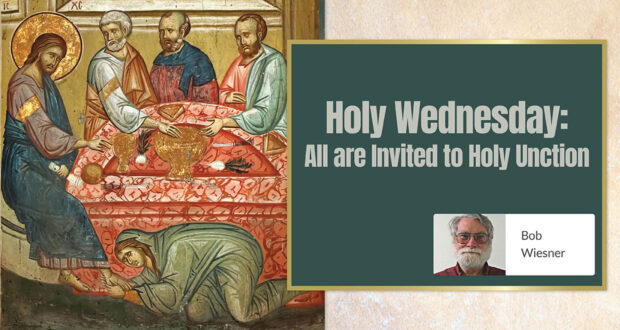Summary
A special service is held on Wednesday of Holy Week when all are invited to receive Holy Unction for the healing of soul and bodyThe services of Holy Week in the Byzantine tradition are rather more extensive than in the Roman Church. Each day is dedicated to one aspect or another of Jesus’ final week before the events of Good Friday.
The three days following Blossom Sunday or Willow Sunday (known as Palm Sunday in the West) commemorate aspects of the Lord’s teachings during his final visit to Jerusalem. These three days are dedicated to Christ the Bridegroom, Who is about to consummate His marriage to humanity in His life-giving death.
Dedication to the Bridegroom
Monday of Holy Week is dedicated to the Patriarch Joseph, who prepared the founding of the nation of Israel in Egypt. The Gospel for the day relates the fate of the barren fig tree. Finding no fruit on the tree, Jesus curses it; it is later found to have withered.
The story has long been interpreted as the end of the Old Covenant with Israel, which rejected the Messiah and thus has withered away spiritually; this sets the stage for the inauguration of the New Covenant, a new Israel, ratified by the Blood of Christ.
Tuesday carries on the theme of judgment with the tale of the lamp-bearing virgins who did not prepare for the coming of the bridegroom; they are shut out of the bridal party while the watchful virgins who conserved their oil are welcomed with joy.
Again, the torch is being passed. An unfaithful and heedless Israel no longer has a place in the New Covenant, while those who recognize the bridegroom’s coming find a place of honor in the bridal party.
Holy Wednesday
The highlight of these three days comes on Holy Wednesday when the commemoration of the sinful woman anointing the feet of Jesus is celebrated. Also called Spy Wednesday, it recalls the betrayal by Judas.
The theme of judgment continues as the unrepentant Judas comes to a very bad end; the sinful woman, in contrast, comes to salvation through her penitential tears and service of anointing Jesus’ feet.
The Lord rebukes Judas for thinking in material terms on this occasion; service to God must take precedence over pragmatic attitudes toward material riches.
The costly nard could find no greater use than the anointing of Jesus, Who remarks that the woman has anointed Him for His death. This observation by the Lord gives rise to one of the most beautiful customs in the Byzantine churches.
Holy Unction (Anointing of the Sick or Extreme Unction in the West) sees far greater use among the Eastern churches than is usual among Roman Catholics.
One need not be fatally ill to request Holy Anointing; the Epistle of James does not specify deadly illness as a prerequisite for the sacrament. Of course, in practice, a condition should be somewhat serious before a priest is summoned; one should be wary of trivializing a sacrament, after all!
But the most serious illnesses afflicting the human race are not physical. Whatever one’s physical state of health, all can be certain that the spiritual ills of the soul are far more likely to cause deadly harm; no one is immune to the ravages of moral disease, of sin.
A Holy Invitation
So it is that among Byzantine Christians, a special service is held on Wednesday of Holy Week when all are invited to receive Holy Unction for the healing of soul and body. In remembrance of the service rendered by the sinful woman, vespers is served along with ample opportunity for Confession, followed by the anointing of all who choose to approach.
Thus, a suitable preparation is made for the events of Good Friday, when all should recall our Baptism when we died with Christ in order to rise with Him.
According to canon law, all Catholics are privileged to receive sacraments in any Catholic church without regard to ritual differences. Thus, Roman Catholics are free to participate in the Holy Wednesday services in any Byzantine Catholic church. Most Byzantine priests are familiar with the Roman form of Confession, so the Eastern form need not be known.
St. John Paul II repeatedly urged Roman Catholics to become familiar with the riches of Eastern Christianity; Holy Wednesday offers a wonderful opening for a beautiful introduction to the Eastern spiritual outlook.
If there is a Byzantine Catholic church near you, feel free to call them for the time of Holy Wednesday services and partake of this splendid opportunity to expand your knowledge and appreciation for the universal Church!

 Seton Magazine Catholic Homeschool Articles, Advice & Resources
Seton Magazine Catholic Homeschool Articles, Advice & Resources
